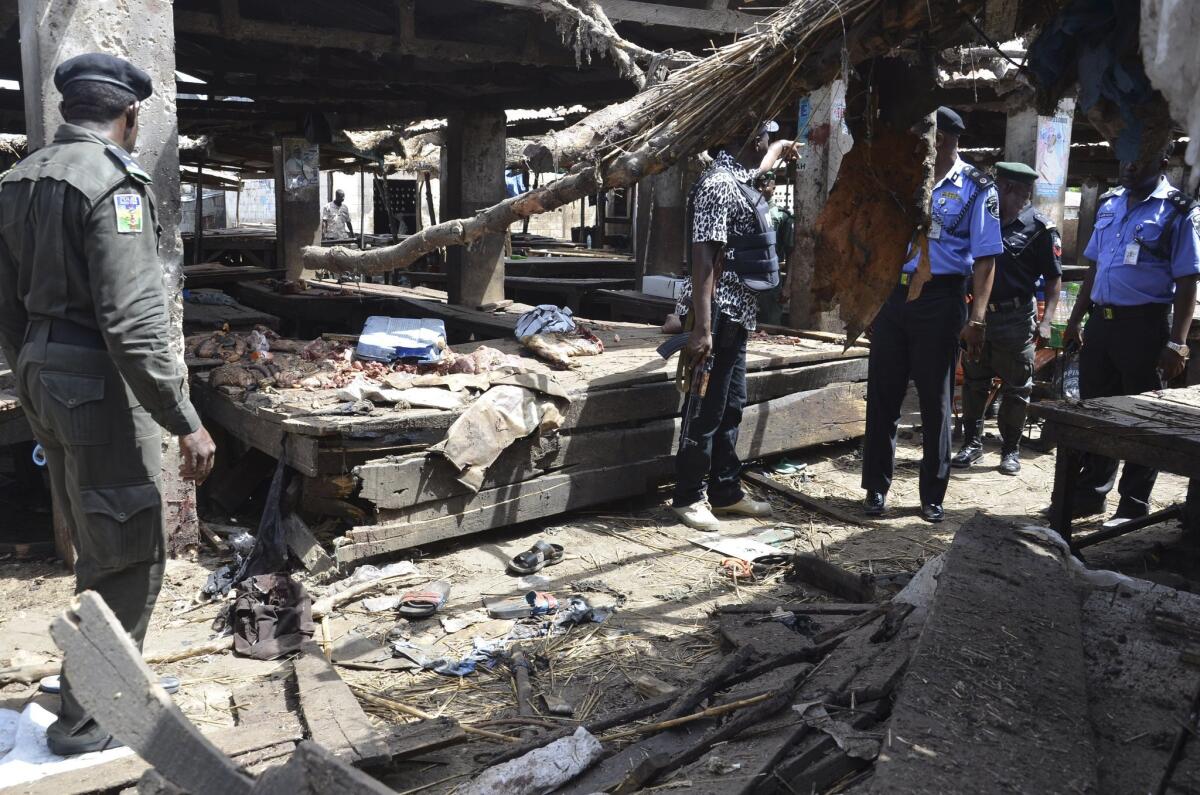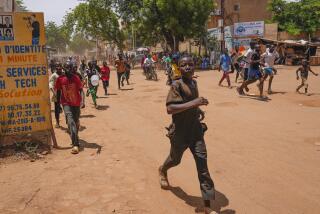Militants defy new Nigerian leader with attacks on northeastern city

Police officers inspect the site of a suicide bomb attack at a market in Maiduguri, Nigeria, on June 2.
- Share via
Reporting from Johannesburg, South Africa — A bombing Tuesday killed dozens of people in the northeast Nigeria city of Maiduguri, the latest in the almost daily attacks there since the inauguration last week of the country’s new president.
The blast at a market was widely blamed on Boko Haram and was seen as an ominous response to President Muhammadu Buhari’s pledge to crush the militant Islamist group.
At his swearing-in Friday, Buhari called Boko Haram “godless” and “mindless” and said his top priority on taking office was to destroy it. He announced he was moving the command center of the military to Maiduguri, capital of Borno state, at the center of the battle.
Buhari’s inauguration represented a rare case of an opposition leader winning election and assuming office in a nation plagued by poor governance and corruption. He faces high expectations among Nigerians, but could see his luster fade if he doesn’t swiftly deal with Boko Haram and restore security in the northeast.
Buhari, a former army general and military dictator who ruled the country briefly in the mid-1980s, met with military commanders Tuesday to discuss progress in the war against Boko Haram amid speculation he might sack some military leaders.
He flies to Chad and Niger on Wednesday, his first foreign visits since taking office, to discuss joint military operations against the group.
Fighters believed to be from Boko Haram attacked Maiduguri before dawn Tuesday, then melted away. Hours later, a bomb exploded at a meat market, killing as many as 50 people, according to news agencies.
At least 30 people died in bomb attacks over the weekend, including a blast Saturday at a Maiduguri mosque.
In recent months, Boko Haram fighters have retreated from many towns and villages in the northeast and have either gone underground or moved to bases deep in the dense, cave-pocked Sambisa Forest. The group has largely given up attempts to hold territory and run a caliphate, or Islamic state, and has returned to suicide attacks and bombings of soft civilian targets such as markets and transport stations.
In another sign of defiance from Boko Haram, a new video released Tuesday by the group -- without the presence of its leader, Abubakar Shekau -- claimed that Boko Haram still held large tracts of territory as well as towns such as Dikwa, Gamborou and Damasak.
The camouflage-clad man speaking in the video was anonymous, carrying an AK-47 and standing in front of two SUVs with his face obscured by a scarf.
“Here in Sambisa you can travel more than four to five hours under the black flag of Islam by car or motorbike,” he declared. “And we are uncountable in the forest of Sambisa. We are thousands of mujahedin here.”
The speaker’s tone and mannerisms differed from those of Shekau, who normally appears in Boko Haram’s propaganda videos. The group has renamed itself the Islamic State in West Africa after pledging allegiance recently to Islamic State.
The speaker held up cards that he said were Nigerian military IDs from soldiers he said the group had killed. The video continued with gruesome footage of Boko Haram fighters shooting wounded soldiers in the head and the bodies of civilians who appeared to have been dragged from their cars and killed.
The 10-minute video also showed Boko Haram fighters posing near the ruins of a Nigerian warplane they claimed to have shot down. The insurgents referred to previous Nigerian President Goodluck Jonathan, suggesting the jet was shot down before Friday. The video statement threatened regional leaders and also mentioned President Obama and French President Francois Hollande.
Buhari’s decision to fly to Niger and Chad within days of taking office signals how crucial he sees the help of regional armies in grappling with Boko Haram. It was a sharp departure from the previous government, which had prickly relations with neighbors.
Chadian and Nigerian troops drove Boko Haram from scores of towns and villages across northern Nigeria. However, Chadian President Idriss Deby has been highly critical of Nigeria’s military, saying it refused to cooperate and communicate about tactics.
At one point, Chadian officials complained that Nigeria’s military failed to secure the towns their army had liberated from Boko Haram, allowing the group to return.
Buhari last week thanked Nigeria’s neighbors for their help and promised that in future Nigeria would play a leadership role in regional security.
The insurgency in the northeast has hit Nigeria’s economy hard, with trade in the area all but paralyzed and agriculture halted. Communications have been disrupted by Boko Haram’s destruction of mobile phone towers, schools and hospitals shut down and 1.5 million people forced to flee their homes.
Thousands of people, mainly men and boys, have been killed and hundreds of women and girls were abducted, more than 500 of whom have been freed in recent weeks.
Follow @robyndixon_LAT for news out of Africa
More to Read
Sign up for Essential California
The most important California stories and recommendations in your inbox every morning.
You may occasionally receive promotional content from the Los Angeles Times.








